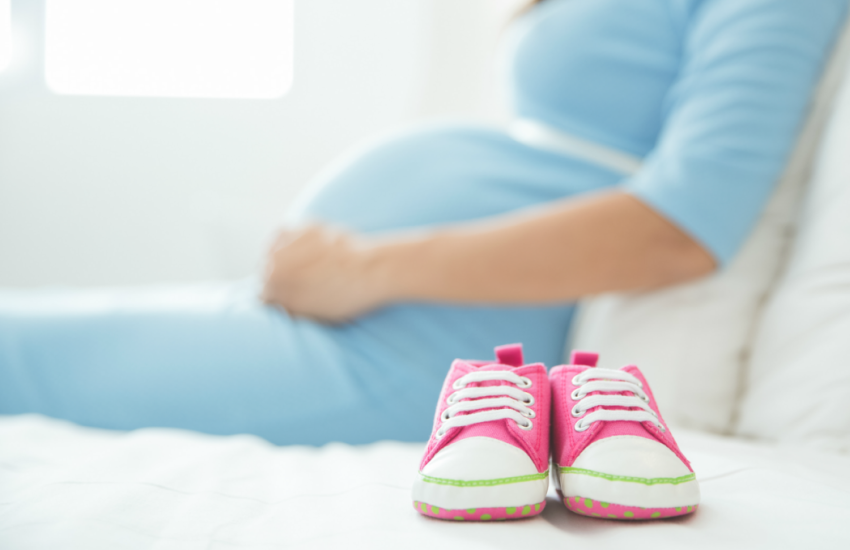To witness the birth of a child is our best opportunity to experience the meaning of the word miracle.
– Paul Carvel
Pregnant women’s microbiome
The intestinal microbiota of pregnant women is determined by their pre-gestational state in particular: weight, nutritional deficiencies, medical conditions, as well as by the way they experience pregnancy for example: weight gain, their eating habits, if there are complications, among others1. At the same time, the bacterial profile of the mother-to-be will affect the baby‘s development and date of birth as well as the mother’s health. It was discovered that women with more Lactobacilli colonies appear to be protected from excessive weight gain during pregnancy … and their children more often reach the ideal percentiles for birth weight1. On the other hand, low microbial diversity during the first trimester of pregnancy is associated with an increased risk of gestational diabetes for the woman1.
In modern times, families benefit from a fairly complete perinatal follow-up. Infant and maternal mortality rates have fallen and there are more and more fertility solutions. Despite these advances, pregnancy still presents risks for the mother and the unborn child. Gestational hypertension is the most common complication, affecting as many as 10% of pregnant women2. According to the Society of Obstetricians and Gynecologists of Canada, gestational diabetes affects more than 5% of all pregnancies in Canada3. Finally, pre-eclampsia is another serious complication of pregnancy, with one in seven Canadian women who will suffer from it. The magic of procreation does not always happen without glitches …
Probiotics in all of this?!
A contributing factor to the health of the pregnant mother and the developing baby is the balance of the maternal bacterial flora, as much its intestinal bacterial landscape as its vaginal microbial garden. The numerous benefits that good bacteria can provide to the host systems, the pregnant woman and her “roommate” (the fetus) are not to be taken lightly. Probiotics may decrease the risk of pregnancy complications such as pre-eclampsia, gestational diabetes and – consequently – premature birth4,5. The first complication can occur from the 20th week of pregnancy, causing a rise in blood pressure and a buildup of protein in the urine and thus interfering with the ability of the placenta to feed the fetus with vital oxygen and indispensable nutrients6. Gestational diabetes, in turn, increases the likelihood of having a caesarean delivery before reaching full term1. Another cause of preterm birth is urinary or vaginal infection during pregnancy, which is common due to hormonal changes and compression of the bladder and reproductive system7.
Probiotics can provide resistance against pathogenic bacteria, by producing anti-inflammatory cytokines and regulating urinary and vaginal pH to allow good bacteria to reside there and drive out bad species1,4. In addition, targeted interventions for probiotic supplementation have improved insulin sensitivity and reduced blood glucose (blood sugar)7. A reduction in the risk of gestational diabetes of the order of 60% has been noted with the use of probiotics, as long as the mother-to-be keeps a balanced diet8. The impact of probiotics seems to occur through the following mechanisms: the promotion of microbiota balance, the normalization of intestinal permeability and the control of inflammation9.
Lastly, the authors of the huge successful Norwegian Mother and Child Cohort Study found that the use of probiotic milk products in early pregnancy also had a protective effect that allowed pregnant women to safely carry a pregnancy to term6 . Further research is needed to determine the best time to administer the probiotic adjuvant to pregnant women, as the choice of time seems crucial during this important period10. In addition, the optimal dosage remains to be fixed as there seems to be lacking consensus in this regard. Taking probiotics during pregnancy would have beneficial effects, however, it is best to discuss supplementation with a health professional who knows your medical record11.
Flash quiz to see who the experts are!
True or False? A healthy and well balanced diet is a prerequisite to stimulate conception and put the odds on one's side to have a pregnancy and childbirth without complications.
True. Invest in your diet, for you and the whole family!
True or False? Age is the main factor determining the risk of preterm birth, when the woman is under 20 or over 35 years of age.
False. Several other factors are at stake, such as: infections (STIs, bacterial vaginosis, urinary tract infection and others), overweight or extreme thinness, chronic diseases, close pregnancies, taking drugs and/or smoking.
REFERENCES
1Dunlop AL, Mulle JG, Ferranti EP, Edwards S, Dunn AB et Corwin EJ. Maternal Microbiome and Pregnancy Outcomes That Impact Infant Health : A Review. Adv Neonatal Care. 2015 ; 15 (6) : 377-385.
2Centre Hospitalier Universitaire Sainte-Justine. Fiche PDF des complications de grossesse chez la mère.
[Site web]. Consulté le 29 janvier 2018.https://www.chusj.org/fr/soins-services/C/complications-de-grossesse/complications-mere/Fiches
3Baby Center Canada. Le diabète de grossesse. [Site web]. Consulté le 29 janvier 2018. https://www.babycenter.ca/a1048921/le-diabète-de-grossesse
4Jarde A, Lewis-Mikhael AM, Moayyedi P, Stearns JC, Collins SM et al. Pregnancy outcomes in women taking probiotics or prebiotics : a systematic review and meta-analysis. BMC Pregnancy Childbirth. 2018 ; 18 (1) : 14.
5Web MD. Can probiotics reduce pregnancy risks ? [Site web]. Consulté le 28 janvier 2018. https://www.webmd.boots.com/pregnancy/news/20180124/probiotics-reduce-pregnancy-risks
6MedPageToday. Probiotics May Lower Risk of Adverse Pregnancy Outcomes — Probiotic milk intake tied to lower preeclampsia risk in late pregnancy. [Site web]. Consulté le 29 janvier 2018. https://www.medpagetoday.com/obgyn/pregnancy/70708
7Silva-Zolezzi I, Samuel TM et Spieldenner J. Maternal nutrition : opportunities in the prevention of gestational diabetes. Nutr Rev. 2017 ; 75 (suppl 1) : 32-50.
8Rogozińska E, Chamillard M, Hitman GA, Khan KS et Thangaratinam S. Nutritional manipulation for the primary prevention of gestational diabetes mellitus : a meta-analysis of randomized studies. PLoS One. 2015 ; 10 (2). [E-publication].
9Isolauri E, Rautava S, Collado MC et Salminen S. Role of probiotics in reducing the risk of gestational diabetes. Diabetes Obes Metab. 2015 ; 17 (8) : 713-719.
10British Medical Journal Blog. Women taking probiotics during pregnancy might have lower pre-eclampsia and premature birth risk. [Site web]. Consulté le 29 janvier 2018.
http://blogs.bmj.com/bmjopen/2018/01/23/women-taking-probiotics-during-pregnancy-might-have-lower-pre-eclampsia-and-premature-birth-risk/
11Dispensaire diététique de Montréal – Les suppléments de probiotiques sont-ils sécuritaires durant la grossesse ? [Site web]. Consulté le 29 janvier 2018. https://www.dispensaire.ca/article/supplements-probiotiques-securitaires-grossesse/





